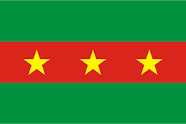Difference between revisions of "Language/Ewe/Vocabulary/Days-of-the-Week"
m (Quick edit) |
m (Quick edit) |
||
| Line 1: | Line 1: | ||
<div class="pg_page_title">Ewe - Days of the Week</div> | |||
In | {{Ewe-Page-Top}} | ||
<div class="pg_page_title">Ewe Vocabulary - Days of the Week</div> | |||
Hi [https://polyglotclub.com/language/ewe Ewe] learners! 😊<br> | |||
In this lesson, we will learn how to say the different days of the week in Ewe. Knowing the days of the week is essential for daily communication and scheduling activities. Let's get started! | |||
__TOC__ | __TOC__ | ||
== | == Days of the Week == | ||
Here are the seven days of the week in Ewe: | |||
{| class="wikitable" | {| class="wikitable" | ||
! Ewe !! Pronunciation !! English | |||
|- | |- | ||
| Dzoɖa || dzoh-dah || Sunday | |||
|- | |- | ||
| | | Blɔɖa || blow-dah || Monday | ||
|- | |- | ||
| | | Kɔɖa || koh-dah || Tuesday | ||
|- | |- | ||
| | | ɖaɖa || dah-dah || Wednesday | ||
|- | |- | ||
| | | ɖɔɖa || doh-dah || Thursday | ||
|- | |- | ||
| | | meɖa || meh-dah || Friday | ||
|- | |- | ||
| Memleɖa || mehm-leh-dah || Saturday | |||
| Memleɖa || | |||
|} | |} | ||
It is important to note that Ewe days of the weeks are based on literal translations. For instance, Memleɖa is translated as "resting day", which is similar to what we call "Saturday" in English. | |||
Fun fact: Did you know that Ewe people celebrate a festival called Hogbetsotso every first Saturday of November? The festival celebrates the migration of the Ewe people from Notsie in present-day Togo to their current settlements in Ghana and other countries in West Africa. | |||
Now we will practice using these words in context. Let's say that two friends are planning their activities for the week. | |||
* | * Person 1: Blɔɖa be na ɖenyigba. (Monday is my busy day.) | ||
Saturday | * Person 2: Mawu be nye li meɖa. (I will go to church on Friday.) | ||
* Person 1: Meɖa ƒe no wo be? (What do you have planned for Saturday?) | |||
* Person 2: Memleɖa me nya alõŋ. (I will relax on Saturday.) | |||
== Conclusion == | |||
Congratulations! You now know how to say the days of the week in Ewe. Don't forget to practice using them in context with native speakers on [https://polyglotclub.com Polyglot Club]. You can also check the [https://polyglotclub.com/language/ewe Ewe] [https://polyglotclub.com/find-friends.php?search=send&d=0&f=36&offre1=2005 vocabulary] section for more words and phrases. | |||
<hr>➡ If you have any questions, please ask them in the comments section below.<br>➡ Feel free to edit this wiki page if you think it can be improved. 😎 | |||
== | {{#seo: | ||
|title=Ewe Vocabulary - Days of the Week | |||
|keywords=Ewe, vocabulary, days of the week, language learning, Polyglot Club, Find native speakers, questions | |||
|description=In this lesson, you will learn how to say the different days of the week in Ewe. Illustrations of cultural information and interesting facts will make this intermediate-level lesson enjoyable and easy to understand. | |||
}} | |||
{{Ewe-Page-Bottom}} | |||
Revision as of 20:56, 3 March 2023
Hi Ewe learners! 😊
In this lesson, we will learn how to say the different days of the week in Ewe. Knowing the days of the week is essential for daily communication and scheduling activities. Let's get started!
Days of the Week
Here are the seven days of the week in Ewe:
| Ewe | Pronunciation | English |
|---|---|---|
| Dzoɖa | dzoh-dah | Sunday |
| Blɔɖa | blow-dah | Monday |
| Kɔɖa | koh-dah | Tuesday |
| ɖaɖa | dah-dah | Wednesday |
| ɖɔɖa | doh-dah | Thursday |
| meɖa | meh-dah | Friday |
| Memleɖa | mehm-leh-dah | Saturday |
It is important to note that Ewe days of the weeks are based on literal translations. For instance, Memleɖa is translated as "resting day", which is similar to what we call "Saturday" in English.
Fun fact: Did you know that Ewe people celebrate a festival called Hogbetsotso every first Saturday of November? The festival celebrates the migration of the Ewe people from Notsie in present-day Togo to their current settlements in Ghana and other countries in West Africa.
Now we will practice using these words in context. Let's say that two friends are planning their activities for the week.
- Person 1: Blɔɖa be na ɖenyigba. (Monday is my busy day.)
- Person 2: Mawu be nye li meɖa. (I will go to church on Friday.)
- Person 1: Meɖa ƒe no wo be? (What do you have planned for Saturday?)
- Person 2: Memleɖa me nya alõŋ. (I will relax on Saturday.)
Conclusion
Congratulations! You now know how to say the days of the week in Ewe. Don't forget to practice using them in context with native speakers on Polyglot Club. You can also check the Ewe vocabulary section for more words and phrases.
➡ If you have any questions, please ask them in the comments section below.
➡ Feel free to edit this wiki page if you think it can be improved. 😎
